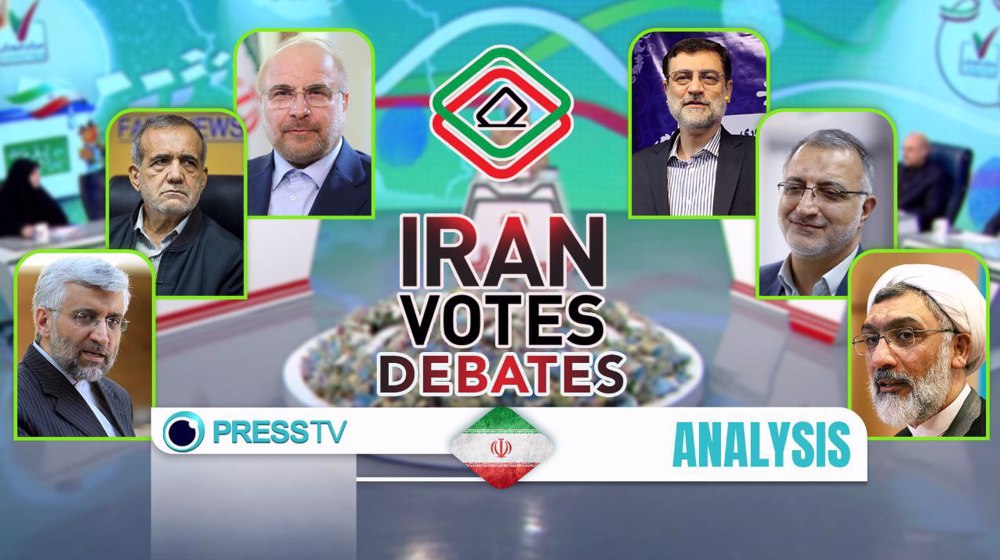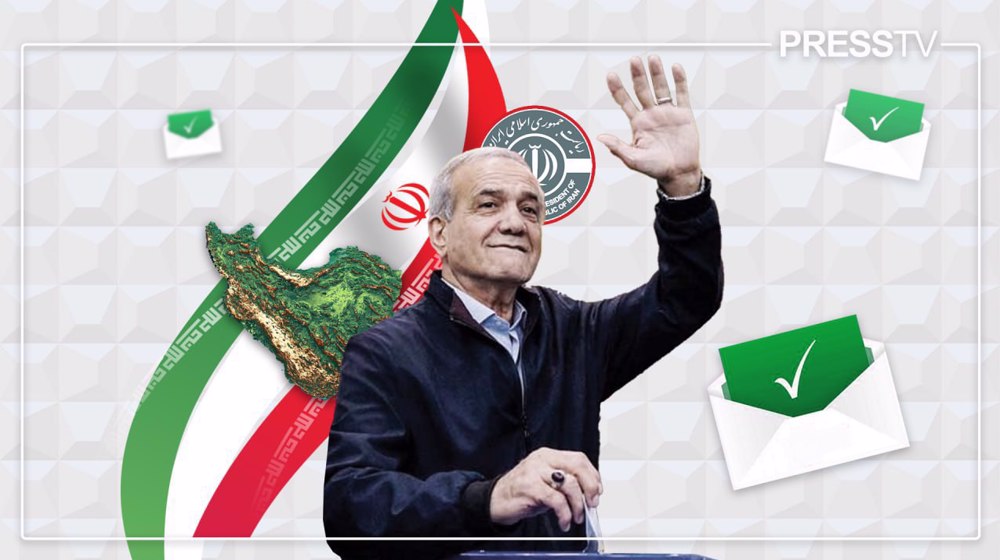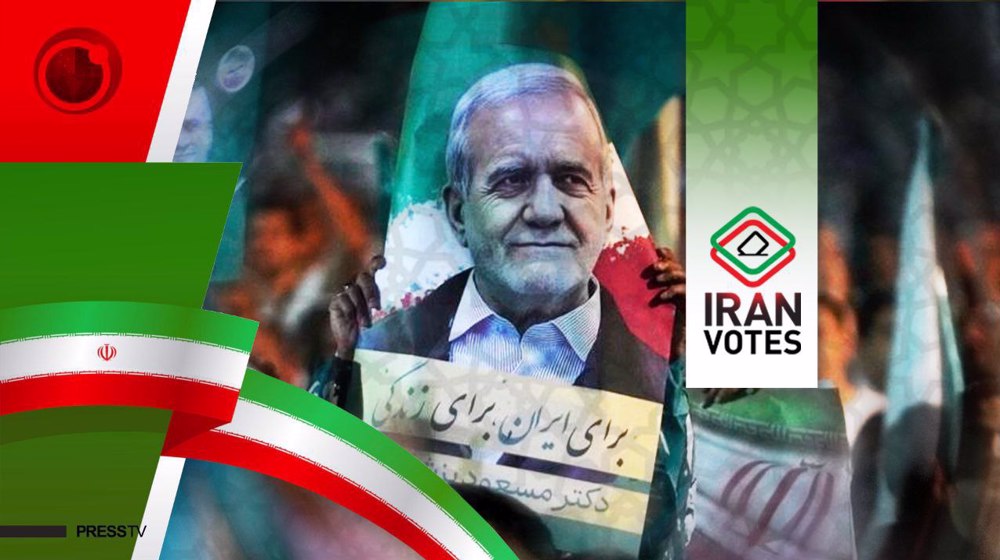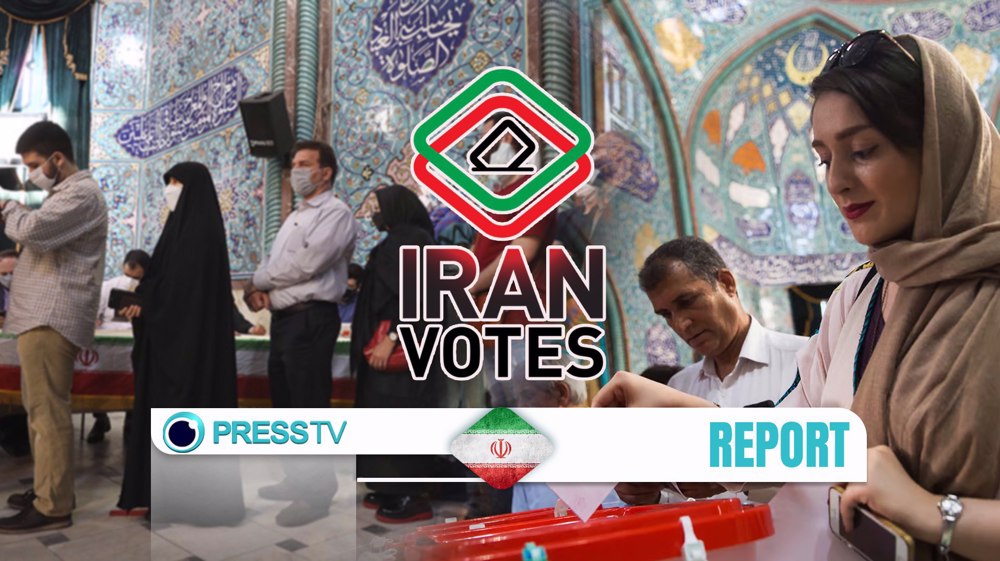Analysis: How fifth and final debate in 2024 Iran presidential election unfolded
By Alireza Akbari
The fifth and final televised debate ahead of the June 28 snap presidential election in Iran was held on Tuesday afternoon with the participation of six candidates vying for the top executive office.
The theme of the debate was making the government efficient, which followed four other debates in the past week that centered on the themes of economic, social, cultural and foreign policy issues respectively.
The debate opened with the remarks of the Leader of the Islamic Revolution, Ayatollah Seyyed Ali Khamenei, who emphasized the significance of “moral integrity” among six presidential contenders.
Divided into three segments, the debate saw the candidates engaging in engaging discussions on socio-economic strategies in the first two parts and the closing segment provided each candidate with six minutes to deliver their closing remarks, making the last-ditch effort to win the electorate.
Segment 1
In the opening segment of Tuesday's presidential debate, the focus was primarily on the candidates' economic priorities in meeting the expectations with each candidate seizing the opportunity to outline his vision for economic growth, offering a glimpse into his strategies to address pressing issues.
Amir-Hossein Ghazizadeh Hashemi, a former lawmaker and head of the Foundation of Martyrs and Veterans Affairs, emphasized the importance of welfare provision and economic expansion as key solutions to the nation's economic challenges.
He detailed his plan to match salaries with soaring inflation rates, support marriage initiatives, continue President Ebrahim Raeisi’s policies in the housing sector, liberalize car imports, complete unfinished projects, enhance women's roles in society, support the disabled community, and combat corruption.
Alireza Zakani, the Mayor of Tehran and former lawmaker, reaffirmed his commitment to upholding the country’s Constitution and ensuring the just distribution of wealth across the country.
He outlined supportive packages for various sectors including energy, housing, health, food security, welfare, job creation, job security, and facilitation of marriages to bolster public welfare.
Saeed Jalili, a former nuclear negotiator and head of the top security body, identified currency stability and job creation as his government's top priorities.
He highlighted the untapped potential in rural areas, likening them to "leaping cells," and advocated for supporting farmers through subsidies to alleviate deprivation.
Jalili also underscored the critical role of women in society, linking their empowerment to national growth.
Former interior affairs minister Mostafa Pourmohammadi underscored the importance of economic growth and stability, stating that "production is the backbone of the economy."
He pledged to restore stability to the capital market within a year and emphasized eliminating obstacles to production, promoting market stability, and reforming the bureaucratic system through the introduction of an "electronic government."
Parliament speaker Mohammad Baqer Qalibaf warned against external threats to Iran's peace and security, vowing to prioritize “peace-building efforts.”
He pledged to pursue every avenue for problem-solving and outlined his concrete plans to address the country’s economic challenges and strive to safeguard the interests of the people.
Masoud Pezeshkian, a former health minister and senior lawmaker, highlighted the necessity of addressing the root causes of economic issues, advocating for reducing the divide between the government and the people, promoting expert-based decision-making, and fostering transparency.
He emphasized the importance of consensus-building and unity in tackling economic woes, positioning his government as one that listens to the voices of the people and prioritizes cooperation over discord.
Segment 2
In the second segment of the four-hour debate, the focus turned to the economic expectations of the Iranian people from their future president.
A recent field survey conducted by the IRIB revealed that the top priorities for the people include addressing economic challenges, enhancing welfare programs, tackling unemployment, fighting corruption, and improving international relations.
Ghazizade Hashemimade promises regarding his government's economic agenda, pledging that his proposed plans would come to fruition within a four-year timeframe.
He outlined key pillars of his economic strategy, highlighting the importance of achieving economic growth through collaborative efforts and adopting an open foreign policy, as well as ensuring fair resource distribution for social equity.
Drawing from the targets set in the seventh development plan, which aims for an eight percent economic growth rate, Ghazizade Hashemi emphasized the crucial role of the private sector and investments in realizing the objectives of the five-year plan.
Zakani placed a strong emphasis on combating corruption as a top priority during his tenure, asserting that those engaging in economic malpractice would face a “red card.”
He advocated for fostering closer ties with neighboring nations and implementing initiatives to advance the economic goals of the country.
Zakani also stressed the importance of economic growth, increased production, and financial discipline in his economic policy agenda.
Jalili echoed the call for achieving an eight percent economic growth rate, underscoring the need for meticulous planning and dedicated efforts to reach the ambitious target.
He emphasized that efficiency could be attained through strategic investments and effective management practices.
Pourmohammadi highlighted the need for enhanced social security provisions, particularly for individuals facing illnesses or disabilities that prevent them from working.
He also reiterated his commitment to combating corruption through measures such as promoting transparency and facilitating the free flow of information.
Mohammad Baqer Qalibaf detailed his government's proposed "supportive shield" initiative, which aims to offer comprehensive assistance to the population by addressing key issues such as healthcare access, essential goods provision, housing affordability, agricultural support, and rural job creation.
The veteran politician pledged to conduct his foreign policy initiatives in alignment withthe national interests and legal frameworks of the country.
Pezeshkian outlined his plans to enhance national welfare by curbing wasteful spending and enforcing strict adherence to the rule of law to combat corruption effectively.
He emphasized the need to reform Iran’s international relations as a crucial step towards achieving economic growth and stressed the importance of fostering unity and consensus domestically.
Segment 3
At the end of the final presidential debate, candidates summed up their plans and presented a synopsis of what they have to offer for efficient governance, aiming to captivate the attention of voters.
In his closing remarks, Ghazizadeh Hashemi asserted that through strategic planning and unwavering determination, the nation's challenges could be overcome.
Drawing from his experience as the Tehran Mayor, Zakani emphasized his hands-on approach to working closely with the people, showcasing his ability to navigate challenges facing the people.
Jalili championed the notion of unity among all ethnic groups, referring to them as “valuable assets” and promoting harmonious coexistence through fostering connections.
Pourmohammadi highlighted his roots in the foundation of the revolutionary discourse, positioning himself as a candidate deeply ingrained in the core principles of the Islamic Republic's genesis.
Qalibaf underscored the significance of the upcoming election, emphasizing that the outcome of the polling on June 28 would shape the future trajectory of the nation and its populace.
Pezeshkian expressed confidence in the solvability of the country's issues, proposing a comprehensive approach that combines both soft and hard power strategies, integrating diplomacy with practical on-the-ground initiatives to effectively address the nation's challenges.
VIDEO | Thousands evacuated in Ethiopia amid earthquakes, volcanic eruption fears
Revealed: Israeli ministers eye restoration of illegal settlements in Gaza through genocide
How Los Angeles’ pistachio tycoons facilitated and profited from wildfires
Iraqi PM: Iran was in Syria to fight terrorism; presence requested by Damascus
Hamas: Israel's massacre in Jenin camp won’t break resistance
60 bodies recovered from abandoned South African gold mine: Police
Biden administration ‘quietly’ circumnavigating own ban on TikTok: Report
Iran Navy takes delivery of first advanced ‘signals-intelligence’ destroyer










 This makes it easy to access the Press TV website
This makes it easy to access the Press TV website